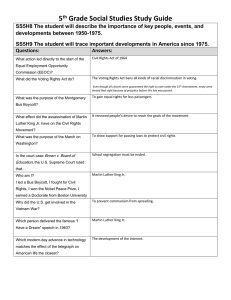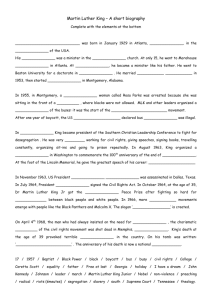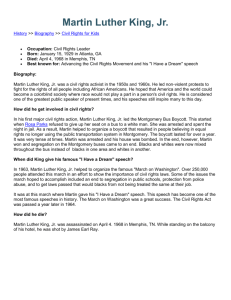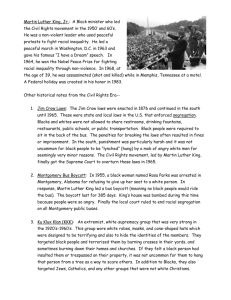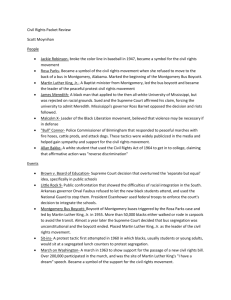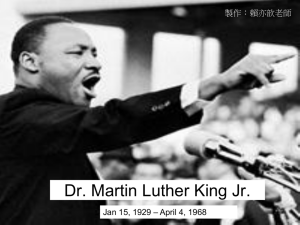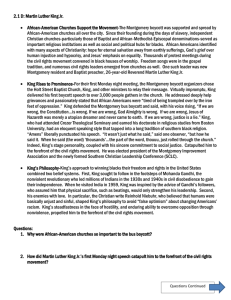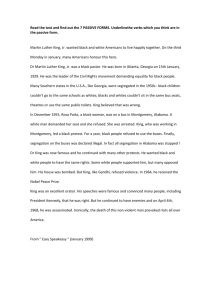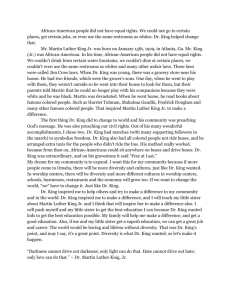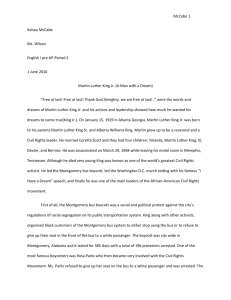Martin Luther King Jr.
advertisement
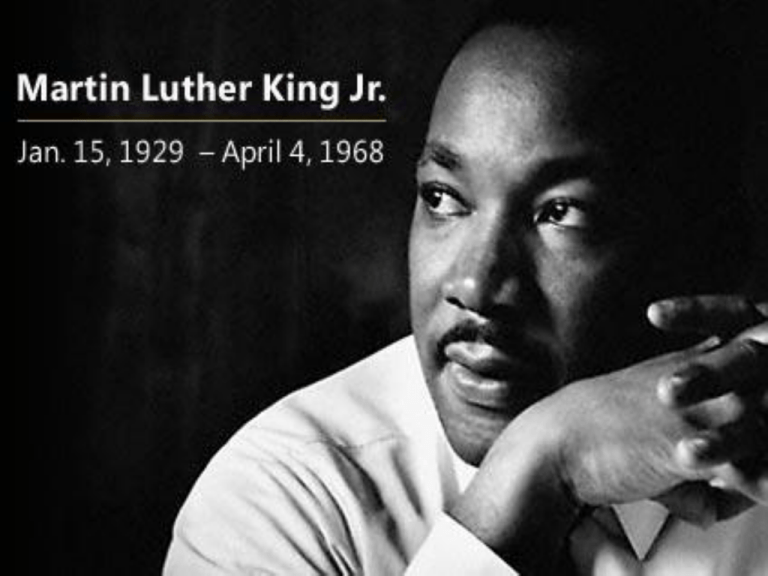
“I have a dream that my four little children will one day live in a nation where they will not be judged by the color of their skin but by the content of their character…” ----Martin Luther King Aug. 28th, 1963 Early Life • • • • • He was born as Michael Luther King, Jr., but later changed his name to Martin. He came from a family of pastors of the Ebenezer Baptist church. Martin Luther attended segregated public schools in Georgia, graduating from high school at the age of fifteen; he received the B. A. degree in 1948 from Morehouse College, a school where both his father and grandfather graduated from. With a fellowship won at Crozer, he enrolled in graduate studies at Boston University, completing his residence for the doctorate in 1953 and receiving the degree in 1955. In Boston he met and married Coretta Scott, a young woman of uncommon intellectual and artistic attainments. Two sons and two daughters were born into the family. His Death • At 6:01 p.m. on April 4, 1968, a shot rang out. Martin Luther King, Jr., who had been standing on the balcony of his room at the Lorraine Motel in Memphis, TN, had a gaping wound that covered a large portion of his jaw and neck. • A great man who had spent thirteen years of his life dedicating himself to nonviolent protest had been defeated by a sniper's bullet. Gandhi's Influence Who? What? How it Influenced Him? Henry David Thoreau Wrote a paper on Civil Disobedience . He argued that People should not allow governments to overrule, what they think is right (Morals). People must avoid acquiescence (not objecting when their rights are infringed on) as it allows the government to use them for further injustice. First Contact with NonViolent Resistance. Martin Luther was so fascinated with the idea of refusing to cooperate with the with a corrupted system. He took from Thoreau’s writing that not cooperating with evil, is a moral obligation. Mohandas Ghandi Lead India to Independence “I am more convinced than through the philosophy ever before that the method of “Peaceful Resistance”. of nonviolent resistance is the most potent weapon available to oppressed people in their struggle for justice and human dignity” The Montgomery Bus Boycott -After Rosa Parks’ arrest, Jo Ann Robinson, head of the Women’s Political Council issued a flyer throughout black community acknowledging Parks’ arrest. -the article continued to state that 3/4 of bus riders are black, therefore buses cannot run if they do not use public buses - encouraged all black to stay off the buses the following Monday, and agreed that the bus boycott would continue The Montgomery Bus Boycott - King investigated the case where 15 year old Claudette Colvin refused to give up her seat on the bus <-- this occurred before Rosa Parks' arrest -Montgomery buss Boycott was planned by Edgar Nixon and led by King -boycott lasted a total of 385 days -King was arrested during the boycott, and led to a court ruling which ended racial segregation on buses Poor People's Campaign • along with the Southern Leadership Conference, King organized the Poor People's Campaign – focused on economic justice – housing the poor – rebuilding America's cities from the recession • Known as part of the second phase of the civil right’s movement • Helped all poor people, not just blacks, though majority of the people living in poverty were black (November 27, 1967) Poor People's Campaign (November 27, 1967) • King pointed out that the congress gave "military funds with alacrity and generosity," but provided "poverty funds with miserliness.“ •Under an “Economic Bill of Rights”, poor people would be supported with a $30 million anti-poverty package. •King was assassinated before the end of the campaign. Other leaders decided to continue it in his honour, but the Economic Bill of Rights was never passed March On Washington •The March on Washington was for Jobs and Freedom • it took place in Washington, D.C., on August 28, 1963. • the amount of people attended were 250,000 people, it was the largest demonstration ever seen in the nation's capital, and one of the first to have extensive television • Maritain Luther King present his "I Have a Dream" speech Martin Luther King Jr. was one of the most famous civil rights activists in American history, because… • Besides leading the Montgomery Bus Boycott and the Poor People’s Campaign, he instilled the dream of racial equality into African Americans by delivering the famous “I Have A Dream” speech. • He supported the Civil Rights Movement in many other ways, devoting his life into fighting for equality. • American version of Gandhi.
